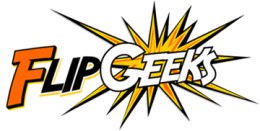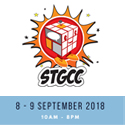LET’S TALK COMICS: Brandon Graham Explains How it Rain Like Hammers
FLIPGEEKS: I just finished reading Rain Like Hammers and I can’t stop thinking about it. One thing I love about it was that it’s so dense with ideas, while never feeling overwhelming on a page. Where a lesser creator might dump pages of exposition, or panels that are packed with too much text, there’s a real sense here that comics as a form is being utilized to the fullest.
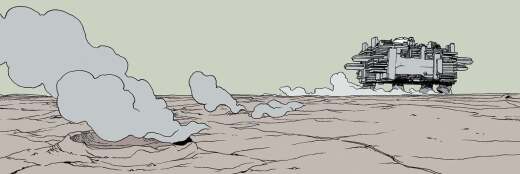
Rain Like Hammers by Brandon Graham
I’m curious about the process of deciding what makes it onto the page. Do you have documents or notes that explain the world/lore/mythos that you kept for yourself and didn’t put here? And how much of it is a conscious decision to avoid exposition vs. sort of just how you have developed your storytelling style?
BRANDON GRAHAM: Well, thanks very much.
I have a lot of rough notes in sketchbooks –but a nice thing about comics is that drawing each page can take hours, so it gives me a lot of time to think it over. Some of my favorite times drawing are when I’m drawing complicated cities and trying to come up with what the function of each building is, what kind of people inhabit them, and what things go on inside them. It can get really silly depending on the book — I remember having a blast drawing a castle full of bear astronomers in the background of a panel in Multiple Warheads.
There’s a lot of making it up as I go along, allowing the story to change as I go and then stressing out about all the possibilities.
Something I try to remind myself is that in comics pictures are part of the storytelling too, so I try to let the drawings carry some narrative weight by themselves. Sometimes the ideal is when the text is almost an after thought.
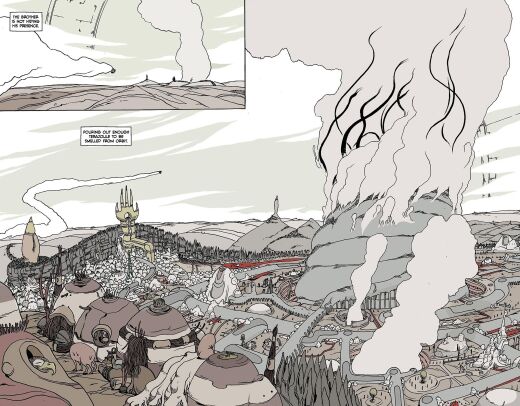
Multiple Warheads by Brandon Graham
If I understand correctly, the book was created in the last couple of years which, for the whole world, has been difficult. I hope that for all that’s been happening, you and the ones you care for have managed to stay well. In connection to all these challenges, and you did allude to this in the autobiographical pieces featured at the end of the collection, can you talk a little about how you kept your motivation with the work? Like, it’s hard enough to survive in the pandemic, but to produce something that’s so expansive. I’m bowled over and would love to know if you have any takeaways about creativity and your artistic process.
I was in a really rough personal place before the pandemic and had started drawing the book already. Some days it was cathartic to talk about things in the work and other days it was no fun to draw about depression when I was in it.
As crude as it sounds, just needing to make a living was also a driving force in getting it done and I think you have to learn to be really forgiving of yourself when doing long form comics. By the 3rd issue I started working closer with a couple editors at Image and I would show them the book like “does this make any sense?” So it’s really nice to hear when it resonates with people.
In the manga Dragon Ball there’s a Hyperbolic Time Chamber called the “Spirt and Time Room” where one day in the outside world lasts a year in the room. The Pandemic gave me that kind of feeling of the world being on hold with nothing else to do but work. So that made it easier.
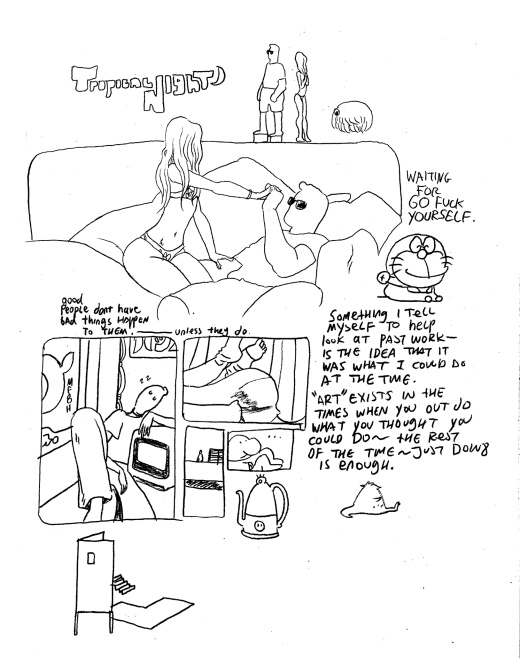
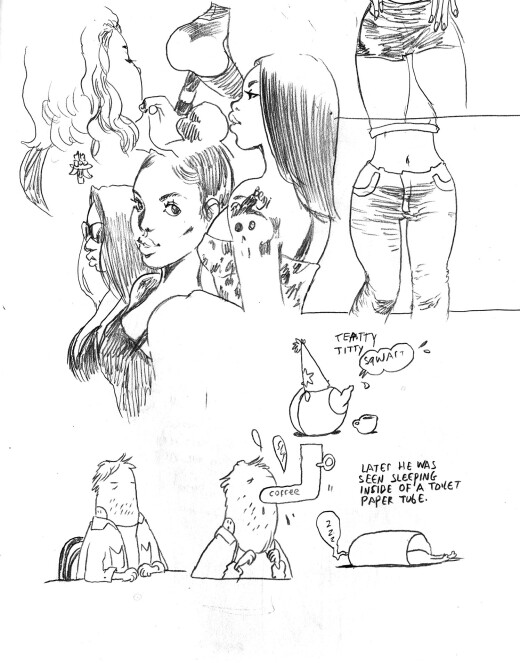
I’m a fan and creator who’s stepped into middle-age during the pandemic. And I don’t know if this is a fair read, but where other comics might be “coming of age” this might be like “coming of middle age” or coming to terms with how we change as we get older. Brik Blok coming to terms with the body he transferred into was great in how it explored the question of how much of us is our mind, and how much do we change if we were to inhabit a different body. Would we still be us? But then when you brought back the “original” body it thrust us into an even bigger identity question. All of that just resonated so powerfully and the way the book asks questions like this is so insightful. Can you talk about the inspiration for exploring these kinds of conflicts? Why were these the kinds of themes you were wrestling with in the work?
A lot of stories are very focused on youth. And It’s understandable, it’s an exciting time with everything in front of you. But I need to talk about where I’m at when I’m making my work.
The idea of the walking city story was something I’d first thought of to talk about depression and feeling stuck when I felt like I’d gotten everything I wanted, but it wasn’t making me happy. I talked a bit about it in the diary comics in the book – I was living on a beach in Canada with a career that was going well, but not much of a life.
By the time I got to drawing this comic, I was dealing with what felt to me like a tremendous falling out with the community I was in — I was canceled.
I’ve had a hard time even understanding how to talk about it. I didn’t want to give attention to something I felt was based on lies — but it’s a real thing I had to deal with that really fucked me up.
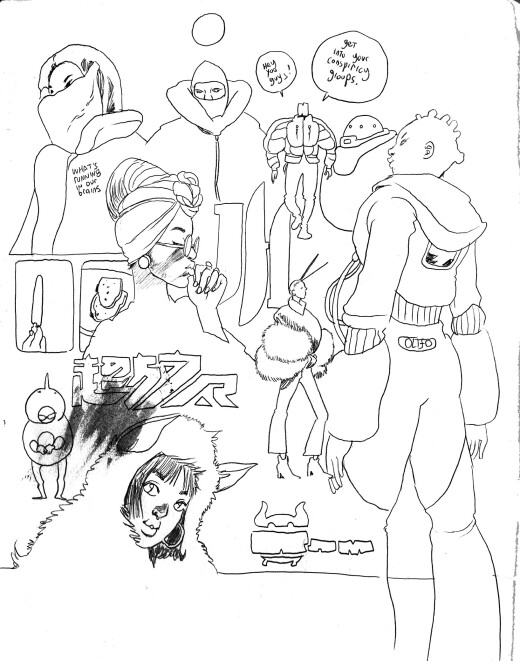
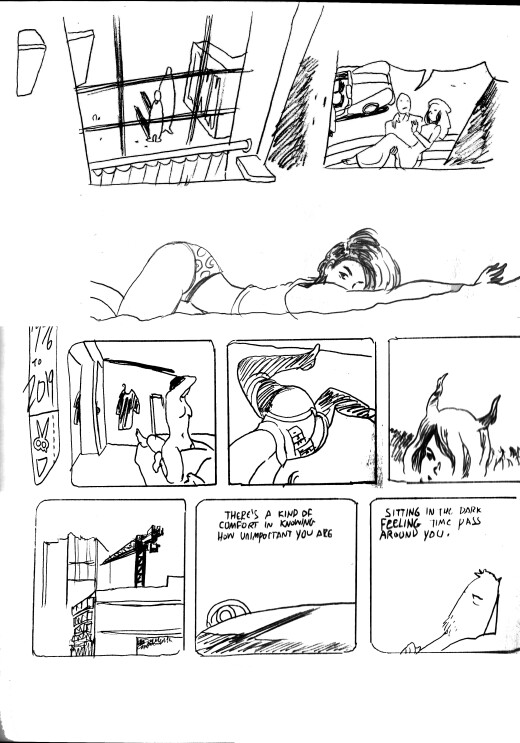
A person I’d never met ran a campaign saying all kinds of vague and awful things to slander me in any way they could. It was insidious and seemingly impossible to push back against. It was like having a stalker that a surprising amount of my peers seemed to believe.
So I pulled away. I got into therapy and focused on my work and myself.
It was the first time I’d really considered quitting comics, but comics are the tool I know best for exploring my feelings, so using them to process my experiences helped pull me back in love with the art form.
It took me a long time to figure out how to talk about it, and it’s still a struggle. In trying to work it out through Rain Like Hammers, I got fascinated with the idea of people mistreating others or going along with the mistreatment of others because they believed they were in the right and anything that suited their goals was worth it. In the book I talk about it as, “collateral damage for noble ambitions.”
So there’s a lot in the book about feeling betrayed and wishing I could be someone else, while also knowing how much we are our physical bodies, our chemistry.
I remember when I started the last issue making a list of everything I wanted to say about what was going on in my life and trying to align that with sewing up the end of the story.
After the book was done I saw a comment online saying they felt uncomfortable that the story seemed to be talking about the public mess I was in a few years back.
It such a strange idea that a person thought I could go through something like that and not talk about it in my work. I don’t think the work would have any value if I wasn’t trying to use it to navigate my real feelings.
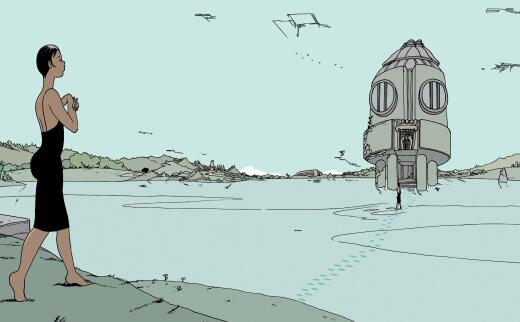
Rain Like Hammers by Brandon Graham
I think it’s inevitable that I ask about all of the food that’s described. I’m enamored with it all. But particularly poignant to me was how Eugene bought that dinner orb from the fancy message board for himself and he enjoys it alone. I’ll have to admit, having lived in pandemic lockdowns, Eugene’s isolation really hit me. But also, that feels like a great way to set up the food we would see and how it threads through and connects the characters. How did you go about creating the rules of the world for how food works? Is it safe to assume you’re a foodie and spent a lot of time thinking about what futuristic food and consumption would be like?
Foodie might be more than I’d use to describe myself, but I’ve certainly used food and tv as a solid cornerstone to cope with depression, or wallow in it- the way Eugene does.
Initially, the dinner orb was going to be an edible castle with a moat of dip.
The vending machines were just a fun way to try to show the feeling of going to the grocery store or getting enough take out to wall my self off and not see anyone.
In a kind of “give a man a mask and he’ll show you the truth,” I like using science fiction to try and show real emotions.
I think it helps ground stories to show tactile thing like eating and the characters interacting with the world around them. That stuff is the most fun for me to draw too.
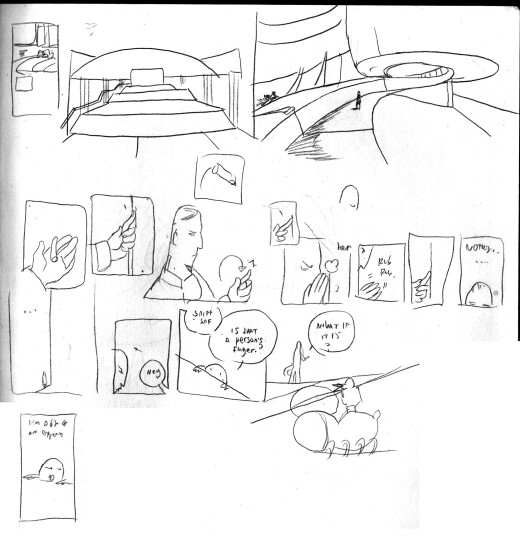
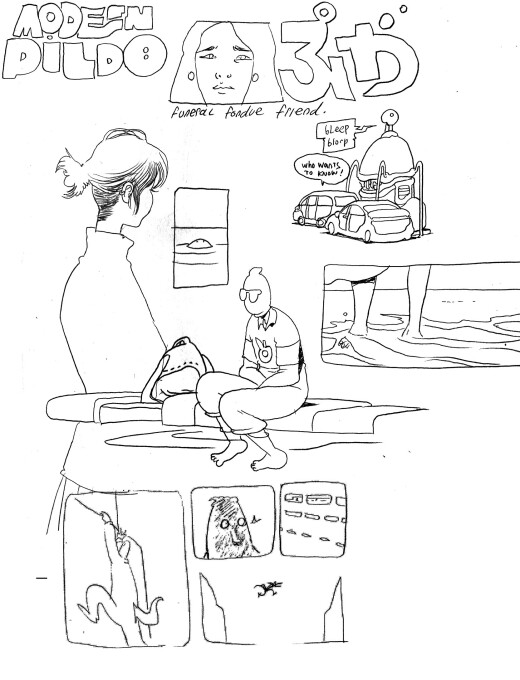
I could keep going on about the book, but I’ll turn the question toward your plans for the future. Are there any books you’re currently working on that you can talk about?
I’ve been trying out some different types of work since Rain (Like Hammers). I’m working as a writer and designer on a video game called Moonray that’s in the works. It’s a giant, weird open world game. Very different from working in comics.
I also took on a job lettering a friend’s comic called Bolero - written Wyatt Kennedy and Luana Vecchio. I made my own font, based off my hand lettering. It really helps me think about how much can be done with lettering as a storytelling tool and it’s just been nice to talk over Wyatt’s writing with him.
[READ – LET’S TALK COMICS: Start 2022 with BOLERO’s Wyatt Kennedy & Luana Vecchio]
After Rain I’m still processing a lot of feelings about the dumb comic industry and I liked the idea of doing work that isn’t so fucking personal that it’s hard to even talk about my motives.
But that said, and because I can’t stay away, I have just started a new comic series that I’m calling The Bastard Machine.
One of the things I spent the pandemic doing was reading every Tintin book and books about its creator, Herge.
I find his life fascinating. He was blacklisted after WWII and accused of being a Nazi collaborator because he was drawing his comics for an occupied paper. But he made it past that and managed to make such amazing, positive work.
I joke about him being the patron saint of canceled cartoonists.
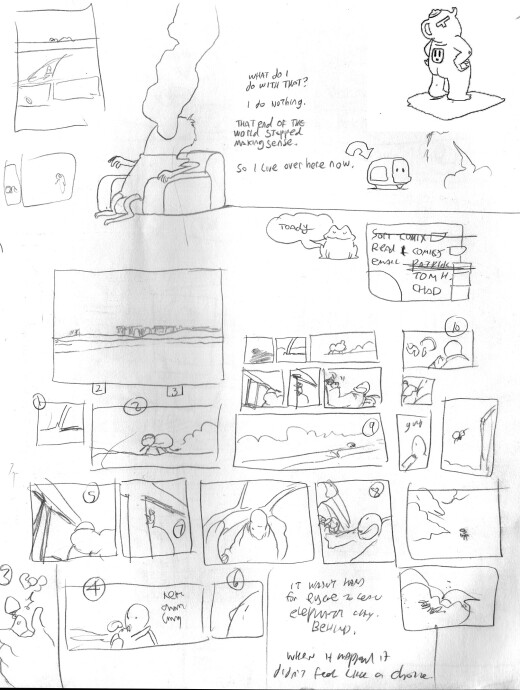
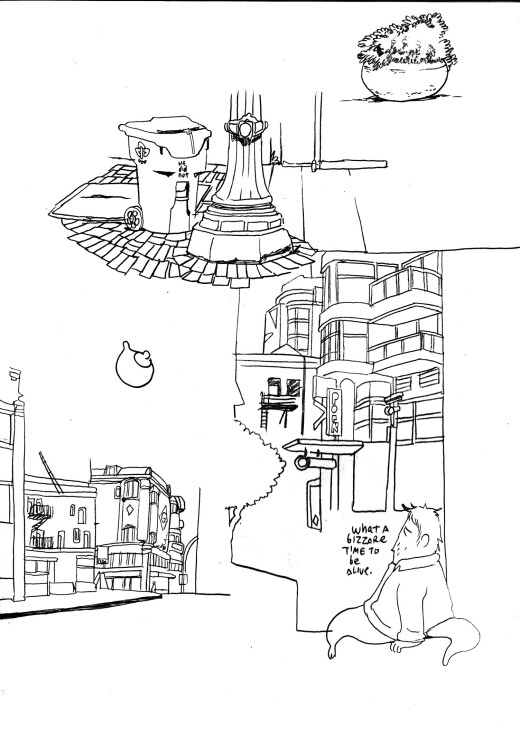
Apart from books you’re currently working on, are there projects that you look forward to doing in the near future? Is there something about the comics medium that you really want to go even further into?
A big part of what I’m hoping my next book turns into is looking at early Marvel comics — stuff like the Ditko Spider-man, along with Tintin and seeing what made that stuff work so well.
In the past, I approached the plot of a story almost as an enemy. As I work on my new story though, I’ve been trying to strip the narrative framework down to the bare minimum of what makes a self contained periodical comic work. The stripped down framework makes it easier to have fun and just make something dense and strange.
I’m interested in learning how to have more fun with comics in a new way.
When I was younger I wanted to show off what I could do in comics, I’m hopefully learning some subtlety in my work. less pages chocked full of puns, I do that kind of stuff more casually now and don’t try to force it.
It got to feel like math homework in the past where I needed to make more jokes per page– and forcing fun isn’t fun.
Are there any trends that you’ve got your eye on? What’s going on that excites you, whether in comics, or with stories in general?
For the first time in my adult life, I’ve pulled back a bit from engaging with a lot of newer comics. It’s very important to me to not become bitter, but there’s a puritanism that’s creeped into modern American comics that I find especially distasteful.
So in that sense I’ve been thinking more about the larger history of comics and aiming to make work that’s having a conversation with so much of what made this art form great over the last century.
Last one, and this goes back a little into the book, as well as your previous work. I’ve enjoyed how you’ve delved into science fiction as a medium for asking big questions. We are living in what people 20 or 30 years ago would consider a sci-fi world, given all of the tech in our pockets and all around us. Can you talk about how you engage with new advancements in science and technology and how you see these influencing your thinking and work moving forward?
I remember as kid seeing the movie Aliens, where the characters talk on video phones and thinking how exciting it would be to use those. Now we have FaceTime and Zoom and the little Mother Boxes we all carry around in our pockets and it becomes hard to appreciate it or even not regard it all as a nuisance. Not even just the technology, but I think it’s really important to be thankful and interested in the world around us.
This interview was done by Carljoe Javier & Norby Ela
